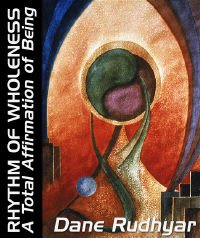 |
| Home | Bio | Art | Music | Literature | Civilization & Culture | Philosophy of Wholeness | Theosophy & Spirituality | Astrology |

RHYTHM OF WHOLENESS A Total Affirmation of Being by Dane Rudhyar, 1983 CONTENTS PROLOGUE PART ONE The Philosophy of Operative Wholeness 1. Prelude to a New Interpretation of Reality 2. The Search for Spiritual Security: The One, the Whole, and Wholeness Page 1 Page 2 Page 3 Page 4 Page 5 Page 6 3. The Movement of Wholeness PART TWO The Cycle of Being 4. The Structure of the Cycle of Being 5. The Four Crucial Phases of the Cycle of Being 6. The Inevitability of Success and Failure 7. Spirit and Mind PART THREE The Cycle of Man 8. Constitution of Man - The Physical and Psychic Bodies 9. Constitution of Man - The Spiritual Entity and the Higher Mind 10. The Structure and Transformation of the Total Person 11. The Cyclic Process of Spiritual Embodiment PART FOUR In The Spirit of Wholeness 12. The Principle of Holarchy and the Interplay of Horizontal and Vertical Relationships 13. Transpersonal Activity versus Mediumship 14. Rites of Passage EPILOGUE |

CHAPTER TWO
The Search for Spiritual Security: The One, the Whole, and Wholeness - 3 The Mystical Experience Of "The One" The vision of the mystic — the "mystical experience" of the unitive state and of the way in which it flows into the world of manifestation and multiplicity — has been formulated beautifully and vividly, to the extent to which an interpretation of it is possible, by the neo-Platonist metaphysician, Plotinus, who lived in Alexandria between 205 and 270 A.D. His vision is expressed clearly by Lex Hixon in his book Coming Home: In Plotinus, the One is not an abstraction, nor an empty or static Absolute. The One is that Power, utterly simple yet rich in potentiality, that generates Being and the various planes of Being — not physically or psychically, but more as a mathematical principle generates a series of numbers. Unlike a mathematical formula, however, the One is a living principle and the infinite series of beings It entails are radiantly alive. . . The One is not a philosophical category but a spiritual reality that Plotinus directly realized as the intrinsic nature of all beings and all planes of Being. . . We can call it "One" if we remember that it is not something that possesses the attribute of unity. . .it is through the illumined intellect that we touch the One, which is the principle of all wholeness. . .The One overflows spontaneously and eternally as several planes or levels of Being, . .the Realm of Intellectual Vision, the Realm of Soul. . . the Realm of life. . .I have tried to make a less paradoxical, more concretely imaginable picture of reality according to the philosophy of monism — a monism which has to include the plurality of a myriad of beings if it is to make any sense — by thinking of an immense globe of undefinable energy-substance. The core of this globe is absolutely homogeneous and unchanging, yet it is endowed with the mysterious capacity to exteriorize itself without these exteriorizations ever leaving the globe. A center of consciousness going from the core of the globe to its circumference would detect different levels of progressive differentiation of the energy-substance and an increasing multiplicity of activities or operations. It would be aware of unceasing changes. These could be said to manifest in cyclic series. Thus time would be implied. However, the ideal observer could also realize that an activity in one direction is always (instantaneously or in cyclic time) polarized and balanced by another activity in the opposite direction. Thus the wholeness of the globe would never be essentially altered. In this sense, change and the activities producing change could be considered illusions. They would be illusory and without real meaning as apprehended by the center of the globe, yet they would be real to any section in the vicinity of the circumference, where indeed tumultuous motion would take place — yet each motion would be exactly balanced by one of opposite polarity. From the point of view of a consciousness operating in a vortex of motion near the circumference, the core of .the globe could be imagined as being either absolutely solid or absolutely void; it would make no difference as long as the state of being at the center, whatever it is, never changes. From this central core, power could be imagined to radiate in all directions as a kind of "superabundance" of being, but (as Plotinus said) "this overflow of the One is intrinsically nothing but the One," because the whole globe is of one energy-substance. Nothing can occur that is extraneous to this globe — to this one and only Reality. According to this picture, a human being would be a microcosm of the whole globe but would operate at a level not too distant from the circumference. He or she would operate where the energy-substance of the globe is agitated, thus in a state of change. Yet because any change experienced there would be balanced by another of opposite polarity, nothing would actually happen in terms of the unchanging wholeness of the globe. This compensation of every action by its polar opposite would be the metaphysical meaning of karma. Once a human being becomes aware of this, he would theoretically cease to be attached to the results of his or her actions — as Krishna demands of Arjuna in the Bhagavad Gita. Because the level of the globe of Reality at which human beings operate is constantly in motion, a human being cannot avoid moving, that is, being active. But if his or her consciousness is attuned to the state of being of the core of the globe, that consciousness "knows" that nothing "really" happens. Astrophysicists now believe that a particle of antimatter corresponds to every particle of matter; if the two meet they annihilate each other, releasing an energy which balances the energy required for their prior existence as separate yet complementary entities. In this context the ideas expressed above should not be startling. It should be clear, however, that what is usually called the universe refers only to the external layers of the globe of Reality. We cannot perceive the globe's core; yet (the mystic says) if through meditation and intense concentration a human consciousness totally withdraws its attention from the objective and external activities of its existence and focuses its energy upon its own center (the essential "I"-subject), this consciousness can resonate to the changelessness and undisturbable peace of the core of Reality. In a sense, the resonance is always there at the center of the individualized consciousness, but the noise of the activities at the surface of human nature makes it impossible to experience the mysterious "silence" of changeless being. Such a picture or model of Reality is monistic because it does not involve two metaphysical realities in irreducible conflict, one termed good and light, the other termed evil and dark. The one globe of Reality includes all conceivable modes of being. It also includes what to us seems to be non-being, since we associate being with activity and therefore with change, time, and conflict. The globe is the Whole, even though we may identify it with its central core and think of it as the One. Nevertheless, a fundamental metaphysical problem remains and plagues any monistic philosophy: Why is there motion, change, and a multiplicity of beings if in reality all is changelessly "the One?" Why did the one God "desire" to create a world of multiplicity? Why does the One which is (as Plotinus said) "perfect because it seeks nothing, needs nothing, overflow, as it were, and its superabundance make something, as it were, other than Itself?" The only possible answer is that there are inscrutable, ineffable, and alogical mysteries that the human mind cannot fathom or explain. I believe, however, that as insufficient and (as Nietzsche said) "human, all too human" as any explanation may be, still we can formulate one that as an interpretation meets human needs, which today urgently call for a significant, transformative answer. The purpose of this book is to offer such an interpretation. No absolute "truth" is claimed for it, only validity in terms of a kind of mentality which is emerging from both Western and Asian traditions. This new mentality is oriented toward the building of a consistent and all-inclusive foundation for a new civilization, which itself would be all-inclusive, not exclusive as all past cultures have been. 5. Lex Hixon, Coming Home (Doubleday & Co., New York, 1978) pp. 110ff. Return By permission of Leyla Rudhyar Hill Copyright © 1983 by Dane Rudhyar All Rights Reserved.  Web design and all data, text and graphics appearing on this site are protected by US and International Copyright and are not to be reproduced, distributed, circulated, offered for sale, or given away, in any form, by any means, electronic or conventional. See Notices for full copyright statement and conditions of use. Web design copyright © 2000-2004 by Michael R. Meyer. All Rights Reserved. |
 |